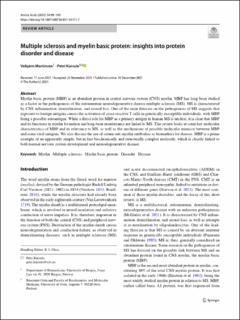Multiple sclerosis and myelin basic protein: insights into protein disorder and disease
Journal article, Peer reviewed
Published version

Åpne
Permanent lenke
https://hdl.handle.net/11250/2991239Utgivelsesdato
2022Metadata
Vis full innførselSamlinger
- Department of Biomedicine [710]
- Registrations from Cristin [9791]
Sammendrag
Myelin basic protein (MBP) is an abundant protein in central nervous system (CNS) myelin. MBP has long been studied as a factor in the pathogenesis of the autoimmune neurodegenerative disease multiple sclerosis (MS). MS is characterized by CNS inflammation, demyelination, and axonal loss. One of the main theories on the pathogenesis of MS suggests that exposure to foreign antigens causes the activation of cross-reactive T cells in genetically susceptible individuals, with MBP being a possible autoantigen. While a direct role for MBP as a primary antigen in human MS is unclear, it is clear that MBP and its functions in myelin formation and long-term maintenance are linked to MS. This review looks at some key molecular characteristics of MBP and its relevance to MS, as well as the mechanisms of possible molecular mimicry between MBP and some viral antigens. We also discuss the use of serum anti-myelin antibodies as biomarkers for disease. MBP is a prime example of an apparently simple, but in fact biochemically and structurally complex molecule, which is closely linked to both normal nervous system development and neurodegenerative disease.
